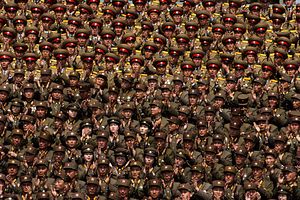In the popular image of North Korea, its citizens are either brainwashed or terrorized into adulating their leader Kim Jong-un. But what if they are genuinely supportive of the dictator?
That’s the possibility raised by a report released late last month by the Institute of Peace and Unification Studies, a think tank affiliated with Seoul National University.
In surveys taken during the last five years and collated in the report, 63 percent of North Korean defectors perceived Kim to have majority support from people within the country. The respondents all fled North Korea between 2010 and last year, while Kim took power in 2011, after the death of his father Kim Jong-il.
At least some outsider observers see the findings as credible. North Korea scholar Andrei Lankov, for instance, believes that modest economic growth during Kim’s tenure has boosted his popularity compared to his father, who presided over a catastrophic famine in the 1990s. In a light nudge away from the state-led model championed by his father and grandfather, Kim has introduced some limited economic reforms, such as allowing farmers to keep a portion of their harvest. While difficult to gauge, these reforms seem to have raised the living standards of at least some North Koreans.
Gareth Johnson, founder of North Korea-focused travel firm Young Pioneers Tours, told The Diplomat that people have been more upbeat about their situation since Kim came to power.
“From my experience, I think people are excited by the improvement in the country and the prospects ahead under his leadership,” Johnson, who has been traveling to the country since 2008, said.
Still, there are serious obstacles to any effort to glean the public mood in what remains one of the most repressive and heavily censored countries on earth.
The report on defectors’ perceptions has significant methodological limitations. Not only is it based on nothing more than their impression of what their countrymen think; its respondents also aren’t representative. Almost 85 percent come from two provinces in North Korea: Ryanggang and North Hwanghae.
But even if Kim’s popularity is real, it’s not necessarily assured for the long haul. While conveying the image of a popular strongman, the report also contains warning signs for Kim. Among defectors who left North Korea last year, more than 90 percent blamed Kim or the government for the weak economy, which remains dwarfed by the prosperous South.
“The big issue with his support in my mind is what will happen when growth stops and people realize he’s only willing to go so far with any kind of reform and there is nothing more to offer,” a frequent visitor who works within the country said, asking to remain unnamed.

































